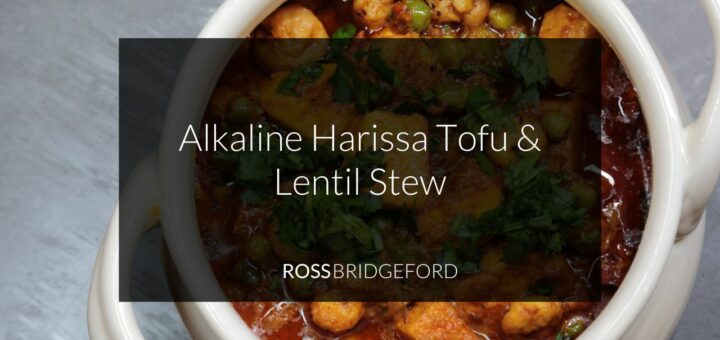Alkaline Harissa Tofu & Lentil Stew
Alkaline Tofu Stew Recipe
I adore this warming, quick & easy stew (almost a curry).
This stew is packed with nutrient-dense, alkaline-forming ingredients such as lentils, tofu, and spinach. Lentils are an excellent source of plant-based protein, fiber, and complex carbohydrates, which provide sustained energy and help regulate blood sugar levels. Tofu is a great source of calcium, iron, and other minerals, and is also rich in protein, making it a great choice for those looking to up their alkaline plant-based protein. Spinach is an excellent source of vitamins A, C, and K, as well as iron, magnesium, and potassium.
The spices used in this recipe, cumin and smoked paprika, not only add flavor but also offer health benefits. Cumin is known for its digestive properties and is a good source of antioxidants. At the same time, smoked paprika is high in vitamin E, which has been shown to have anti-inflammatory properties.
A note on tofu & soy estrogens: the myths around soy products and estrogen being cancer-causing and hormone-disrupting (especially for women) have dated back as far as the 1940s, and none of them have any data or scientific basis. Multiple studies (see references at the end of the page) have shown soy to reduce the risk of cancer. Please don’t fear eating soy products such as tofu here and there.
As one study concluded: “Tofu is a versatile ingredient with many health benefits. As a particular soy food, It also contains high concentration of isoflavones, which possess both estrogen-dependent and -independent properties that potentially inhibit the development of breast cancer” (source)
And another “Higher SI (soy intake) is potentially associated with lessening of BC risk among women independent of oestrogen receptor BC phenotypes.” (source)
Alkaline Harissa Tofu & Lentil Stew
Ingredients
- 1tbsp of coconut oil
- 1 medium brown onions, finely chopped
- 2 large garlic cloves, chopped
- 1/2 tsp ground cumin
- 1/2 tsp of hot smoked paprika
- 1/2 cup green or brown lentils, rinsed and drained
- 1/2 cup green peas, frozen or fresh
- 90g firm tofu, drained, dried and cut into small cubes
- 400g tin of chopped tomatoes
- 2 tbsp of tomato paste
- 1–2 tbsp harissa paste, depending on desired spiciness
- 100g baby spinach leaves
- 50g (about half a bunch) of coriander (cilantro)
- 1 tsp tamari sauce
- ½ tsp rice malt syrup
- Juice of 1 lime
- Himalayan salt and black pepper to taste
- 1/2 head of cauliflower
Instructions
- Heat the coconut oil in a large saucepan over medium heat. Add the onions and season with a pinch of salt. Cook, stirring often, until softened, about 5-7 minutes.
- Add the garlic and cook, stirring frequently, for 2 minutes. Stir in the cumin and smoked paprika and cook, stirring throughout, until fragrant, about 1 minute.
- Add the lentils, peas, tofu, chopped tomatoes, tomato paste, and harissa paste. Stir well and bring to a boil. Reduce heat and simmer for 20-25 minutes or until the lentils are tender and the sauce has thickened.
- Stir in the spinach and allow to cook until wilted, 1-2 minutes. Then add the coriander (cilantro) tamari, syrup, and lime juice. Taste and season with salt and pepper. Remove from the heat.
- Finally, make the cauliflower rice, by breaking the cauli up into smaller florets, and pulsing in a blender until it’s rice sized. You can either serve raw, or gently stir fry for a minute in a little more coconut oil.
- Serve the stew on a bed of cauliflower rice, and a sprig more coriander. You can optionally add a dollop of unflavored coconut yoghurt.
Related Alkaline Recipes:
- Special Alkaline Cauliflower Fried Rice
- 5-Minute Alkaline Dhal
- Moroccan Roast Eggplant (Aubergine) Stew
References:
Okekunle, A.P., Gao, J., Wu, X., Feng, R. and Sun, C. (2020) ‘Higher dietary soy intake appear inversely related to breast cancer risk independent of estrogen receptor breast cancer phenotypes’, Heliyon, 6(7), p. e04228. doi: 10.1016/j.heliyon.2020.e04228.
Qiu, S. and Jiang, C. (2019) ‘Soy and isoflavones consumption and breast cancer survival and recurrence: a systematic review and meta-analysis’, European Journal of Nutrition, 58(8), pp. 3079-3090. doi: 10.1007/s00394-018-1870-z.
Wang, Q., Liu, X. and Ren, S. (2020) ‘Tofu intake is inversely associated with risk of breast cancer: A meta-analysis of observational studies’, PLOS ONE, 15(1), p. e0226745. doi: 10.1371/journal.pone.0226745.






